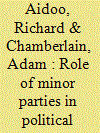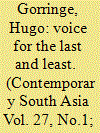| Srl | Item |
| 1 |
ID:
138121


|
|
|
|
|
| Summary/Abstract |
The study of minor parties has largely focused on well-established democracies, even though these political organizations play significant roles in new and emerging democracies. With Ghana as a case study, this investigation provides a theoretical path to understanding the normative role of minor parties in political competition, especially in developing nations with single-member plurality systems. By placing emphasis on the experiences of such parties in Ghana’s 2012 elections in the Fourth Republican dispensation, this article examines the value and importance of minor parties in helping to create and maintain stable democracies. In spite of the recognizable obstacles minor parties face, we argue that they nevertheless contribute to the health of a burgeoning democratic culture.
|
|
|
|
|
|
|
|
|
|
|
|
|
|
|
|
| 2 |
ID:
165250


|
|
|
|
|
| Summary/Abstract |
Between 2009 and 2014, Thirumavalavan, the leader of the largest Dalit party in Tamil Nadu, served as an MP in Delhi. This paper draws on research with the Viduthalai Chiruthaigal Katchi (VCK or Liberation Panther Party) to raise a number of key questions about representation and democracy in a multi-level federal system. Although they are a minor party, their experience of national politics offers insights into the workings of party systems in India. The paper considers the extent to which they are constrained by alliance partners and political rules-of-the-game. It then considers the question of representation, and asks what the VCK managed to achieve in Thirumavalavan’s constituency of Chidambaram and the extent to which they could raise issues at the national level both through formal and disruptive means. Finally, the paper reflects on the advantages and disadvantages for a small party of having a foothold in the Centre and draws out the lessons of the VCK’s experience for our understanding of Indian politics.
|
|
|
|
|
|
|
|
|
|
|
|
|
|
|
|